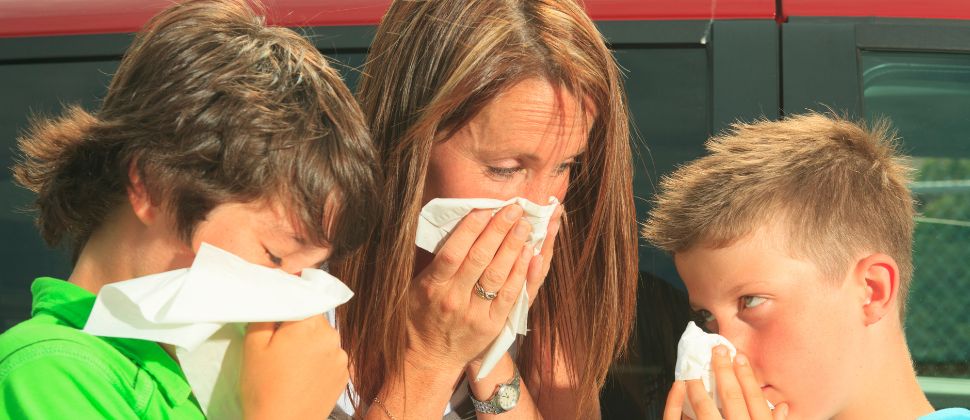Although you might think of allergies as something that only affects children, new allergies to foods, the environment, and more can develop at any time in your life and for a wide range of different causes. One fine day, you happily start eating something which you have been having since childhood but suddenly you notice that your lips are itchy, or you avoid going outdoors on a beautiful sunny day as you start sneezing and sniffing. Ever wondered why all this is happening? People who are suffering from food or weather allergies are curious to know the reason. There are specific immune system reactions that determine our level of reactivity, so it’s not just a case of bad luck if your allergy symptoms are brought on by the local pollen count, a certain cuisine, or your neighbour’s pet. In this blog, we will come across when allergies mainly develop, what are adult-onset allergies, types of allergies, treatments, and many more.
1. When do Allergies Mainly Develop?

A harmless substance such as pollen, animal dander, dust mites, or foods, might cause an allergic reaction in your body. Your body builds a defense after mistaking the trigger for a harmful visitor. You induce an allergic reaction by releasing a substance known as histamine. Depending on the kind of allergen, you might come across some signs of an allergic reaction including itchiness, rashes, swelling, hives, runny nose, problem breathing, vomiting, and scratchy throat. People might remember their first allergic symptoms when they were kids. 1 kid out of 5 is suffering from some kind of allergy or asthma. By their 20s and 30s, many people have outgrown their allergies because they have developed a tolerance for their allergens, particularly food allergens such as milk, eggs, and cereals. However, allergies can appear at any age in a person’s life. You can even develop an allergy to something you didn’t have earlier. It’s still not clear why some allergies develop in adulthood, especially in the 20s or 30s.
2. What Are Adult Onset Allergies?

Our body’s immune system generates many kinds of antibodies to protect us from disease. One of the antibodies is IgE (Immunoglobulin E), which is built to fight against allergy symptoms. As a chemical messenger, IgE travels in cells to notify about the requirement of chemical protection from an outside invader. Adult onset allergies are kinds of allergies that people develop in their adulthood. This could occur in a person’s younger adult years (when they are in their 20s) or in their senior years (when they are 80 years old).
The likelihood of developing adult-onset allergies often decreases if you survive your 20s and 30s without developing any new allergies. The weird thing about adult-onset allergies is that you might be annoyed someday by an allergen that didn’t bother you earlier. Without experiencing any negative consequences, you could have been exposed to the allergy every single day for years. Now that the allergen is around, you can experience a runny nose, itchy eyes, and excessive sneezing.
3. How Are Adult Onset Allergies Developed?

It may seem as though your symptoms have just started if you are prone to a certain type of allergy but have never been exposed to that allergen before. For example, you have never been around pets while growing up and you were not aware that you had an allergy to pet dander. And suddenly your family member bought a pet in your house which leads to a certain allergic reaction in your body.
Many people commonly have allergy symptoms as children, outgrow their allergies as they become older, and develop tolerance in their 20s or 30s. However, allergies can develop or generate an allergic reaction at any period of time. The cause of adult-onset allergies is still not fully clear. Nevertheless, experts think that if you have experienced a very severe allergic reaction or set of symptoms while you were a kid, then your risk of being allergic as an adult will increase. Adult-onset allergies often develop differently in each individual.
4. Which Allergies Are Most Common In Adulthood?

Most people have some kind of allergy. As allergies tend to run in families, it’s not possible to tell in advance whether you will get your parent’s allergies or not. Basically, there are many kinds of allergies that are developed in adulthood but we have explained some of the most common allergies below:
- Seasonal Allergies
The term “hay fever” is also used to describe seasonal allergies. People who have seasonal allergies can experience a runny nose and itchy eyes which is caused by the blooming of plants. After moving to a new area and being exposed to a new ecosystem, new allergic reactions to outdoor allergens may occur. Some of the most common allergens are pollen, grass, ragweed, and trees. Changes in the medication you take may be another reason why you have seasonal allergies as an adult. Or, more precisely, if you quit consuming a specific drug.
The most popular medications for treating seasonal allergies are antihistamines. However, certain antihistamines may also be recommended for conditions like sleeplessness and anxiety. Seasonal allergy symptoms might be different from person to person. However, common symptoms are cough, postnasal drip, fatigue, nasal congestion, and sneezing.
- Pet Allergies
You might have grown up with pets in the house but never had an issue. Suddenly, as you are an adult now, you experience non-stop sneezes and itchiness around them. When someone has a reaction to a pet’s urine, saliva, or dead skin cells, they are said to have pet allergies. These pet allergies get onto the mucous membranes that cover a person’s nose and eyes. Pet allergies can be found on a variety of surfaces such as clothes, carpets, and furniture. For those who have pet allergies, being around some breeds may make their symptoms worse.
There are many different reasons why symptoms of pet allergies can appear in adulthood. Maybe compared to other pets you have lived with, your new pet sheds more. Or perhaps you grew up with a female dog, but the dog you adopted now is a male. Or maybe as an adult, you are spending more time with your pets than you did when you were younger. Perhaps now, as opposed to when you were a child, they sleep in your bed instead of your parents’ room. This could indicate that your nose is suffering as a result of the fact that you are currently exposed to more allergens than you were previously. Everybody reacts differently to pets, resulting in different symptoms. Some of the common symptoms are cough, stuffy nose, difficulty in breathing, itchiness in the eyes, wheezing, and rashes.
- Food Allergies
We have discussed seasonal and pet allergies and they are not the most frequent adult-onset allergies. Food allergy is one of the most frequent adult-onset allergies. In practical terms, these allergies are largely related to food in 50% of cases! Allergies to dust mites and prawns may occasionally occur together. Some people will already be aware of their dust allergy. After some time, they discover that they can’t eat prawns without getting sick. We don’t know how these allergies might be connected, if there is cross-reactivity, or whether this is merely a random occurrence.
People who are allergic to pollen or other airborne allergens experience the same thing. For example, oral allergy symptoms to banana, watermelon, and cantaloupe can coexist with ragweed allergy symptoms. Moreover, birch pollen allergies can coexist with oral reactions to stone fruits such as plums, cherries, and peaches. This is so because the elements contained in these combinations are similar at a certain molecular level. Your body builds a defense against them because it senses them as similar intruders. Some of the common food allergies in adults are allergies to milk, peanuts, shellfish, finfish, and tree nuts.
- Allergies To Stings
Many adults have allergies to the venom of stinging bugs. You might also be allergic to yellow jackets, wasps, and hornet stings if you are allergic to bee stings. The effects of a frequent allergic reaction expand beyond the area of the bite or sting, although they are not life-threatening. The skin might become red and swollen, or there may be a rash or hives elsewhere on the body except where the insect has bitten or stung you. Applying ice can be helpful in reducing the swelling while cleaning the area with soap and water will sterilize it.
Every individual’s reaction to an insect sting differs in severity. However, there are three categories of reactions in general:
- Normal Reaction: In this kind of allergic reaction, you can experience some pain, redness, and swelling around the spot where the insect has stung or bitten.
- Big Local Reaction: In this kind of allergic reaction, with some pain and redness, the swelling may extend beyond the spot where the insect has stung or bitten.
- Serious Reaction: Some allergic reactions are not that common, but in case they occur, they lead to emergencies. Symptoms of such allergic reactions include hives, trouble breathing, rapid pulse, dizziness, diarrhoea, stomach cramps, and many more.
5. Consult With The Doctor

It’s a fact that the allergies can’t be removed from a person’s body completely but they can be managed with a proper treatment. Some mild allergy symptoms can sometimes be managed by limiting exposure to the allergen or by taking medication. But certain symptoms can be so severe that they endanger your life or hinder your daily activities. If you are developing new allergic reactions, then also you must consult with the doctor.
If you haven’t had an allergy test in the past three to five years, your doctor may recommend getting one since new allergies can take that long to manifest. By this test, they will be able to identify any allergies you may have and talk to you about how to treat them. You should reach out for medical help if you observe symptoms such as dizziness, swelling of the tongue or throat, vomiting, diarrhoea, rashes, fever, anaphylaxis, unconsciousness, and seizures.
6. Treatments for Allergies
Some of the possible treatments for different kinds of allergies are mentioned below:
- Antihistamines: Your symptoms may lessen or remain under control if you take antihistamines like cetirizine (Zyrtec) or diphenhydramine (Benadryl). Take these in advance of being exposed to an allergy.
- Keep An EpiPen Handy: An emergency epinephrine shot might need to be carried with you at all times if you have a severe allergy. An epinephrine injection (Auvi-Q, EpiPen, or other brands) given for severe allergic reactions might lessen symptoms until you receive emergency care.
- Medications: They can help lessen immune system reactivity and alleviate symptoms, depending on the allergy. Your doctor may advise taking over-the-counter or prescription pills, liquids, nasal sprays, or eye drops.
- Corticosteroid lotions and ointments: They help in reducing itchiness and limit the spread of rashes. If your rash does not clear up after using this cream for a week, consult your doctor. Corticosteroids are not the same as anabolic steroids, which some athletes use clandestinely to gain muscle mass.
Conclusion
Yes, you might develop allergies later in life. Some might be minor in nature and some could be severe depending on how much of the allergen is in the air at different times of the year. Food allergy is the most frequent allergy that manifests in adults. It occurs when a person consumes or comes into contact with allergens, which triggers their immune system to produce an IgE antibody. If you experience any new allergy symptoms in your adulthood, then consult your doctor as soon as possible to find out what treatments, medications, or dietary adjustments you may need to make in order to manage your symptoms.



